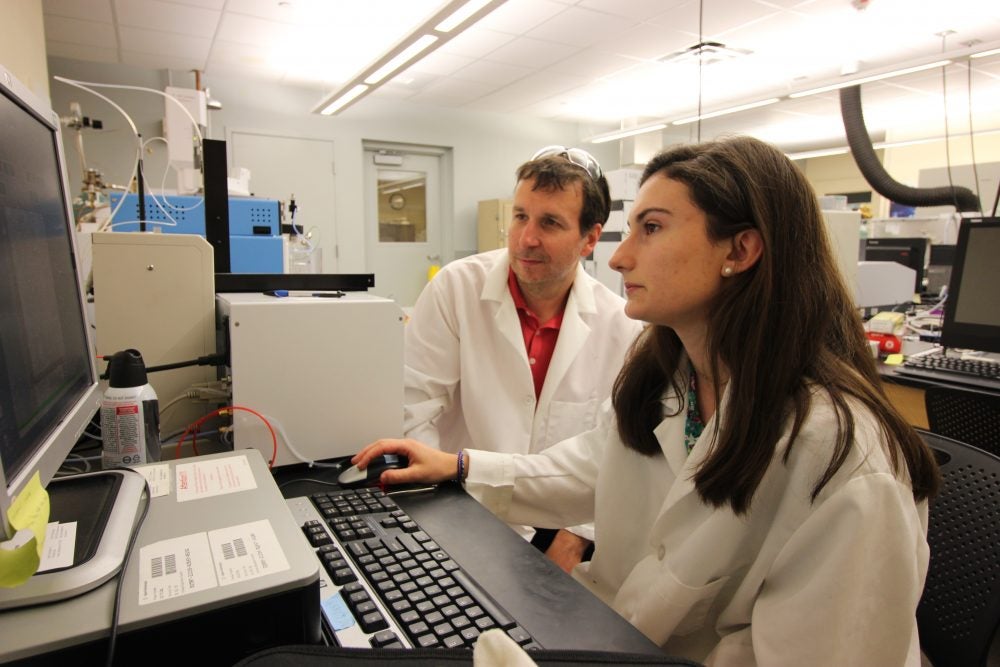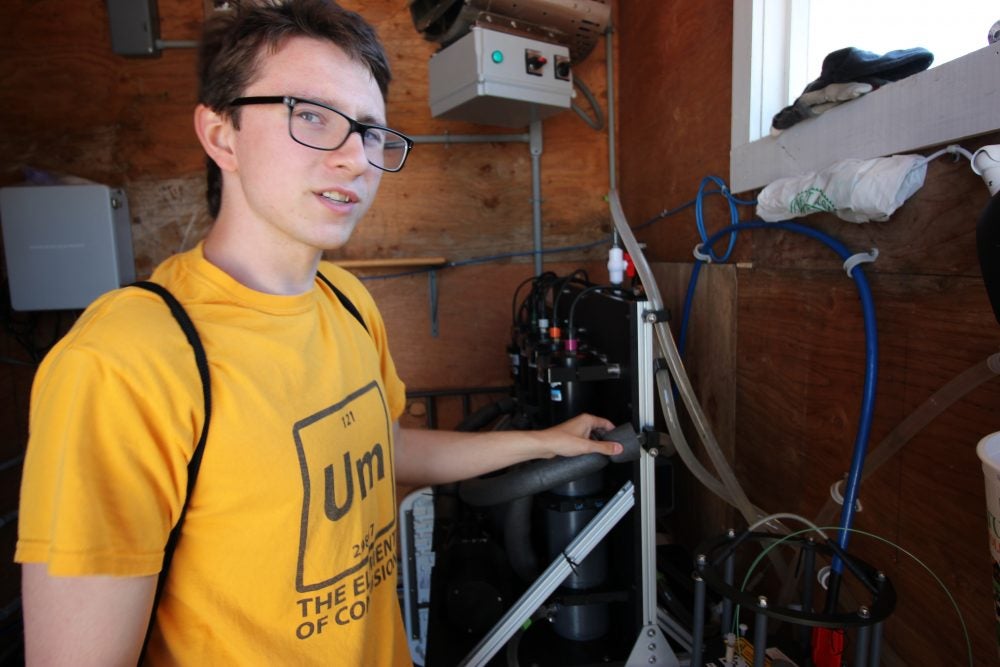
When Krystyna Kula was a child, she learned first-hand about Narragansett Bay as a volunteer for Save The Bay. This past summer, the Rhode Island native returned from her undergraduate institution, the University of Notre Dame in Indiana, to work with Bryant University’s Dr. Christopher Reid, studying how microorganisms transport carbon and other nutrients into larger species.
“We don’t really know right now how carbon moves through the food chain,” explained Kula, a biology major. “We are feeding isotopically labeled carbon to yeast, which will then be fed to a dinoflagellate plankton. That will help us see how carbon moves through the food chain.”
Kula collaborated with SURF mentors Dr. Tatiana Rynearson and Dr. Susanne Menden-Deuer, to complete her research at the University of Rhode Island’s Graduate School of Oceanography, learning how to culture the zooplankton Oxyrrhis marina.
The end goal, said Reid, is to better understand how hydrocarbons, called ‘lipids,’ travel through ingestion from the tiniest zooplankton to economically important species such as shellfish, a process known as ‘trophic upgrading’.
For Kula, her first experience in a research lab was much different from the classroom as she learned to use equipment such as a gas-chromatography machine to separate and identify chemicals from water samples.
“In class, you learn for the test and forget about it, but this is something that has an actual application to the real world,” she said. “This experience is a good look at how it would be if research was my job day-to-day.”
Reid, who hosts a small group of undergraduate and graduate researchers at Bryant, has always tried to foster a friendly working environment through which students can learn together.
“I was a little bit nervous coming in,” admitted Kula, now a sophomore at Notre Dame. “But everyone was really welcoming and helping me with how everything works in the lab.”
Although she has a few years before deciding on graduate school, Kula knows the experience will serve her well.
“I took this past summer to figure out if this was something I could do every day.”
Of Chlorophyll and Plankton
When Christopher Jenkins first arrived at the University of Rhode Island’s Bay Campus from Shoreview, Minn., his goal was to pursue research related to zoo keeping. Then he discovered Narragansett Bay through scuba diving.

“I came here and didn’t do anything involved with a zoo at all,” laughed Jenkins, a marine biology major working with Dr. Colleen Mouw, assistant professor at URI’s Graduate School of Oceanography. “I’ve wanted to get a good work ethic and well-rounded experience, as this is something I have never really done before.”
Jenkins gathered information about ‘absorption’ properties of phytoplankton, or the amount of light they intake. This data allows scientists, explained Jenkins, to identify the occurrence and abundance of specific species in the bay.
“When you have a sample of water, or anything, you have light going through it,” he said at the time. “The floor, for example, has a very high absorption value because you can’t see through it. The idea is we want to look at a water sample and find the absorption patterns that correlate to specific species.”
Jenkins traveled frequently between the shore and lab throughout summer, collecting water and sediment samples and then navigating lab equipment to gather meaningful data about the bay’s various organisms.
“Measuring samples is a pretty tedious process,” said Jenkins. “In the lab, I put water samples in acetone and then ‘sonicate’ them, or blast them with sound waves, which breaks open the cells so the phytoplankton chlorophyll pigments are exposed and we can read them.”
“It’s a steep learning curve,” the marine biology major continued. “When you are in the lab, you have to be able to make sure you are organized and know which step to take and when.”
Jenkins, who continues to advance this work during the academic year in RI C-AIM’s SURF+ program, is looking to finish his degree a year early with a view towards graduate school. His goals for the summer SURF experience, however, were a bit humbler.
“I really like being able to say I can take a good sample and take care of a machine and not have it break on me,” he said with a smile.

 RI NSF EPSCoR is supported in part by the U.S. National Science Foundation under EPSCoR Cooperative Agreements #OIA-2433276 and in part by the RI Commerce Corporation via the Science and Technology Advisory Committee [STAC]. Any opinions, findings, conclusions, or recommendations expressed in this material are those of the author(s) and do not necessarily reflect the views of the U.S. National Science Foundation, the RI Commerce Corporation, STAC, our partners or our collaborators.
RI NSF EPSCoR is supported in part by the U.S. National Science Foundation under EPSCoR Cooperative Agreements #OIA-2433276 and in part by the RI Commerce Corporation via the Science and Technology Advisory Committee [STAC]. Any opinions, findings, conclusions, or recommendations expressed in this material are those of the author(s) and do not necessarily reflect the views of the U.S. National Science Foundation, the RI Commerce Corporation, STAC, our partners or our collaborators.